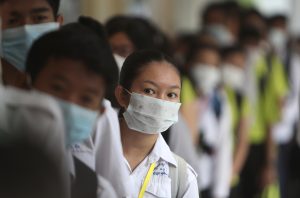The world is facing another threat of pneumonia caused by a novel coronavirus that broke out in Wuhan City, China. According to the latest figures, there were more than 7,700 confirmed cases of the disease globally as of January 30, the vast majority of them in China, although infections have been recorded in at least 16 other countries. The death toll is currently at 170.
The Chinese government has been aggressive in its response, sealing off the city of Wuhan and announcing plans to build two hospitals in just 10 days. However, criticism of the way the Chinese authorities have handled the crisis thus far, including how the government disclosed information on the pneumonia, is apparently becoming more widespread both inside and outside of China.
Questions about the kind of action taken following the outbreak of the novel coronavirus in China will need to be properly examined in the future. For now, it is far too early to draw definitive conclusions. However, what can be inferred at this stage is that the grip maintained by the administration of President Xi Jinping over the flow of information and tight oversight of regional governments in recent years caused regional governments to fear that they would be accused of information leaks and to try to avoid being held accountable for the spread of the disease. As a result, disclosure of information may have been delayed.
Yet the strategy of trying to win people over and maintain order through “Imperial Headquarter Announcements” that suit the government’s agenda is not a phenomenon exclusive to China. There have been many examples in the past, both in authoritarian regimes with no accountability and in democracies, where leaders and authorities have failed in their duty to disclose information to the people in favor of saving their own skin or for immediate gains, as well as examples of the state using information control to suppress inconvenient information or objections.
The problem is that, today, in an era of globalization and increased cross-border movement of goods, money and people, diseases travel rapidly. Flows of people into and out of China are far greater than at the time of the SARS epidemic in 2002 and this makes the threat of this latest coronavirus even more serious. In this age, if an outbreak occurs in a certain country and the government of that country fails to fully disclose information and simply stands by and watches the situation develop, the damage could spread rapidly beyond that country and deal a blow to the rest of the world.
However, the storyline in which damage escalates as powerful control from above prevents proper accountability and the communication of accurate information even on such a life-and-death matter for so many could unfold equally well in either an authoritarian regime or a democracy. Countries where information is not fully disclosed to the public or where people does not constantly demand information disclosure from their leaders or the state will one day fail to contain a critical situation, with serious repercussions that go beyond their national boundaries.
In other words, in today’s international community, where globalization brings not only benefits but also heavy costs that cannot be evaded, the question of how a particular country is governed and how it deals with problems that arise is no longer something that the rest of the world can afford to ignore. The outbreak of another coronavirus only makes this even more abundantly clear.
Mie Oba is a professor at Tokyo University of Science.

































